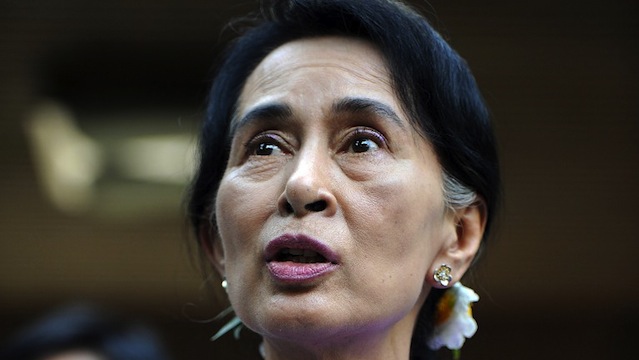SUMMARY
This is AI generated summarization, which may have errors. For context, always refer to the full article.

MANILA, Philippines— She always walked with ease and spoke sweetly, whether it was in English or in her native Burmese. It is no wonder they call her ‘The Lady.’
There were almost no signs that she had just been released from nearly 15 to 21 years of on-and-off house arrest. It was the first time she left Burma in decades and the first time she was back in the United States in 40 years.
I was thrilled when I learned I was fortunate enough to attend her appearance in San Francisco. I was only one of two Filipino journalists in attendance.
Burma, officially known as Myanmar, is in the midst of democratic transition. The international community has been cautiously optimistic about the transition. “The fires of conflict had not all died out in my country,” Suu Kyi warned the attendees.
As early as September 2012, Burmese worldwide were already anticipating ‘The Lady’ to run for president.
At the World Economic Forum, held in Burma on June 5 to June 7, Suu Kyi met President Benigno Aquino III, the son of another democracy icon, Corazon Aquino. The comparisons between the two heroines are unending. She told President Aquino that she hopes to visit the Philippines soon, probably after 2015.
For many Burmese, Suu Kyi is not just a symbol, but the only hope for change.
The iron curtain
Suu Kyi was released in 2010 (and remains free so far). The junta began pulling back Myanmar’s iron curtain.
State media censors began to step back, political prisoners were slowly being released, and restrictions on parliamentary participation had eased. In April of 2012, Suu Kyi was elected to the lower house of parliament. The National League for Democracy (NLD), Suu Kyi’s party, had won 43 of the 45 vacant seats its seats. The once authoritarian state pushed reform after reform, enough to convince international lenders to erase nearly US$6 billion of foreign debt, announced just last January.
Burmese looking to escape the ruling military junta spread throughout the world over the last 50 years including an estimated 100,000 Burmese in the US. The Asia Society, a non-profit international organization that focuses on educating the world about Asia, says that the diaspora may be the key to Burma’s development.
“Suppose you have a friend, but that friend never shows up for lunch when you invite him,” Than Phyo, a Burmese immigrant and math teacher living in New York City told Andrew Billo of the Asia Society. “That’s how our relationship with the Burmese government has been.”
‘Check your temperature’
Her presence in San Francisco was electrifying. This was a chance for many Burmese who said they were ready to go home. “But first ask yourselves why you want to help your homeland,” Suu Kyi said. “Are your intentions to help communities, improve lives? Or do you want to come back thinking it will benefit yourself, first, ‘check your temperature,’” she told her adoring followers.
She spoke about the importance of humility. When someone asked how “intellectuals” can help, she responded this way: “The word ‘intellectual’ itself implies superiority. Do not return thinking you are better than anyone else,” she said. In the eyes of Suu Kyi “VIPs and politicians sitting in the front here are the same as those sitting in the back.”
“Checking your temperature” should be a daily task for leaders and citizens alike. She encouraged everyone to be self-aware.
Abandoned
While she is undoubtedly a heroine for millions, there are other thousands of others who do have the same reverence for her.
I remember about a dozen or so Rohingya protestors outside the USF’s auditorium who were clearly upset at Suu Kyi.
The Rohingya population — at a steady 800,000 — are not recognized as citizens of Burma, and live under substandard conditions in the Rakhine State. The 2012 clashes between the Rohingyas and Buddhists left at least 80 dead and displaced about 100,000 others. The little known humanitarian crisis remained under the radar.
The conflict has pushed many of them into Bangladesh who refuses to accept them as refugees, while Myanmar’s president Thein Sein refuses to recognize them as citizens. The United Nations named the Rohingyas as the “most oppressed” in the world. Sein has made it clear that he wants them out, and until today, Suu Kyi has remained quiet—or vague.
What to do about the Rohingyas? Another global problem even the headstrong Suu Kyi was reluctant to answer.
Does she mean what she says or is not saying, or is it a political strategy?
“If I pretended that I didn’t want to be president I wouldn’t be honest,” Suu Kyi said at the WEF.
The Lady wants the presidency, and speaking on the issue may be political suicide. The pressure to do nothing is louder than the clamor for the Rohingyas’ rights. While she has remained steadfast and fearless in fighting for freedom and democracy, how will Suu Kyi pass this ultimate test of convictions? We will have to wait and see. – Rappler.com
Add a comment
How does this make you feel?
There are no comments yet. Add your comment to start the conversation.